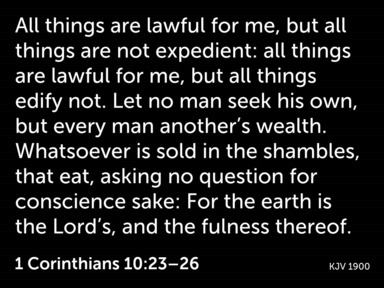The Balance of Christian Etiquette

The one was a table of rebellion, the other a table of remembrance. The one was designed to lead astray; the other designed to lead aright. The one was a lewd table; the other was the Lord’s Table. The one was designed to be a snare, a provision for their lusts; the other was designed to be a spur, a provision by the Lord. At the one table there was a repudiation of all the Lord had done for them; at the other there is a recognition of all the Lord has done for us. In the one case the kinsman-redeemer was absent, he was on Mount Sinai accepting a great revelation; in the other case the Kinsman-Redeemer is absent, He is on Mount Zion anticipating a glorious return. The one table was a monument to their infidelity, idolatry, and immorality; the other was a memorial to His Person, passion, and position. They sat down at the one table to eat and drink and rose up to play. We sit down at the other table to eat and drink and rise up to pray. The one table brought the people face to face with judgment; the other table brings us face to face with Jesus.
